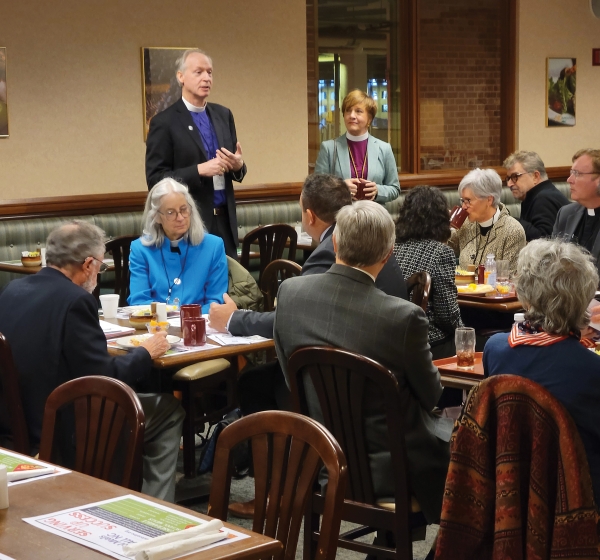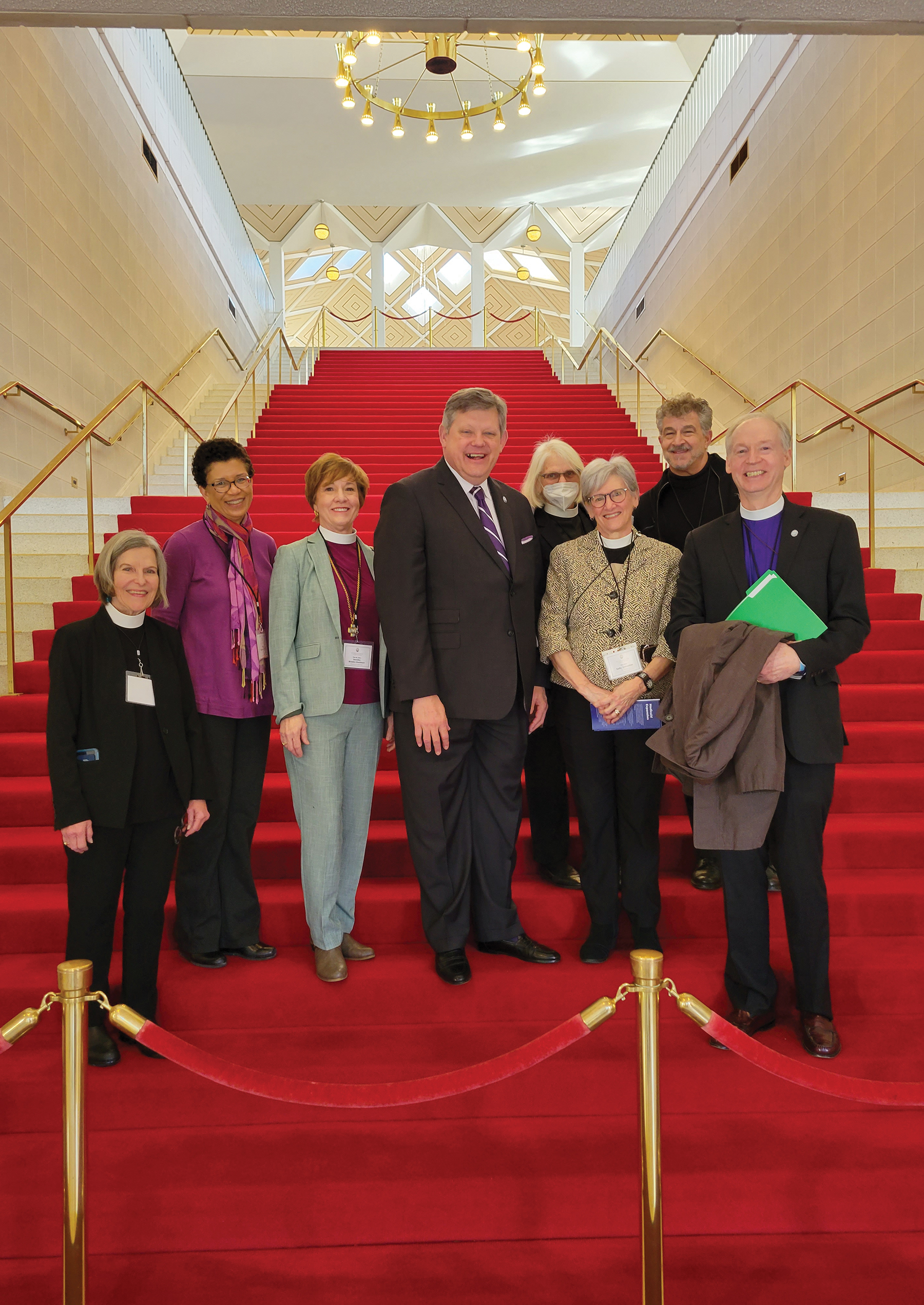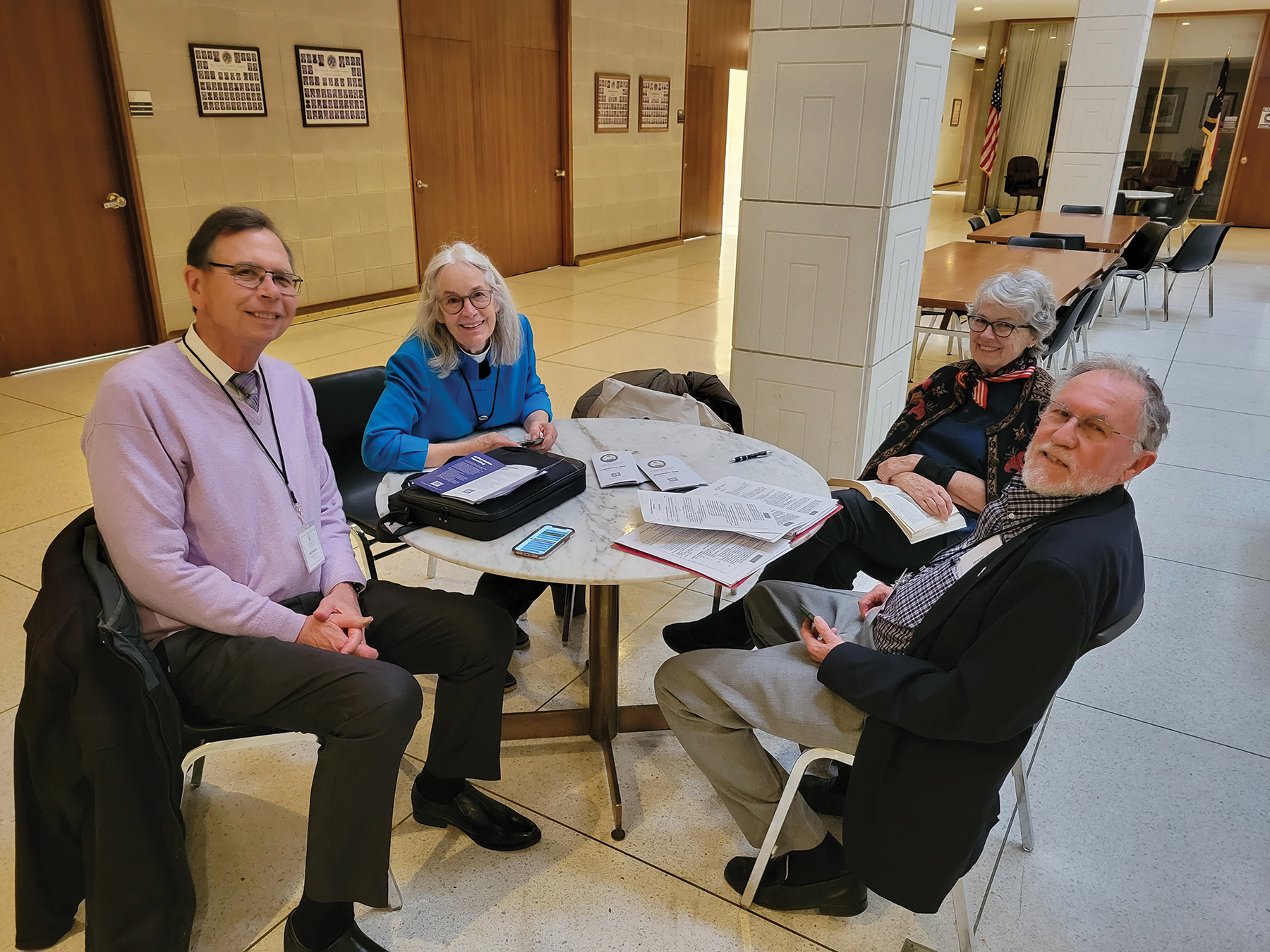Disciple: Advocacy Day 2023

Building relationships one conversation at a time
One March 15, members of several diocesan advocacy teams and committees took part in the first-ever diocesan Advocacy Day at the North Carolina General Assembly. The goal of the day was to have conversations with those in government, where our faith values would be shared and the foundations of relationships laid.
When the Diocese of North Carolina set out to plan an Advocacy Day, the commitment was that it would be an act of formation and a ministry of presence. By pulling together a group of ministries that work to address pressing matters of public policy, the planning also proved to be a successful model for cross-issue collaboration in the public square.
Advocacy Day began as a discussion within the Bishops’ Council of Advice on Public Policy (CAPP). While that group has met regularly with the bishops for almost three years, much of its work has focused on internal deliberations, private outreach to elected leaders, and public letters and statements (“Adding Our Voice,” Disciple, Spring 2022). Over those three years, however, members of CAPP became aware of a growing need to engage more directly in sharing diocesan positions with legislators and to support those ministries doing advocacy work within their specific areas of expertise. Advocacy Day was proposed as a way to begin to meet that need.
The end result was the Rt. Rev. Sam Rodman, the Rt. Rev. Jennifer Brooke-Davidson and 30-plus advocates from throughout the Diocese holding more than 60 visits with legislators at the General Assembly in a single day.
[Images throughout: Scenes from the inaugural diocesan Advocacy Day at the General Assembly on March 15: breakfast with legislators, checking in between meetings and a group photo on the main staircase. Photos by Christine McTaggart]
GEARING UP

Over the course of multiple Zoom meetings in a matter of weeks, co-facilitators for CAPP and leaders from the Bishop’s Committee on Affordable Housing, the Gun Violence Prevention Task Force and the Environmental Ministry Committee, plus the representative to the Medicaid expansion collaborative, Care4Carolina, sketched out the day, coming up with a plan to prepare advocates, coordinate visits and develop succinct, accurate messaging about complex issues. The choice was made in December to focus on the particular areas of affordable housing, gun violence prevention, creation care and Medicaid based on the expectation of what was to be discussed during the legislative session.
Senator Mike Woodard (an Episcopalian from Durham) and his legislative assistant, Carol Resar, helped to steer the loose plans and ideas toward something workable and realistic in the legislative community. Members of diocesan staff provided support throughout the process, from scheduling meetings to developing a brochure on diocesan priorities given to legislators and their staffs.
Advocates and ministry leaders were also clear on how their roles aligned with the separation of church and state. Those who were slated to take part in meetings were given an orientation on what to expect at the General Assembly and how to share their messages. It was an incredibly dynamic process, as the status of legislation before the General Assembly shifted constantly in the days and weeks leading up to March 15.
“Planning for Advocacy Day took many things into consideration to prepare participants,” said the Rev. Sonny Browne, co-chair of the Gun Violence Prevention Task Force. “From practical considerations, such as parking, moving through security and navigating buildings, to advocacy itself, such as using the short time with legislators efficiently and effectively and shifting conversation to another area of advocacy if an impasse was reached with a particular point. All of it helped those of us that took part feel as prepared as we could be going into a day that we knew from the start was going to be fast-moving and require us to be ready to adapt at a moment’s notice.”
Meetings were not held with the expectation that advocates would impose their religious beliefs on elected officials or ask them to prioritize one religion over another. Instead, the focus was on advocacy as witness to deeply held faith values within the Episcopal tradition and our own diocesan priorities, while building relationships with those who might hold different priorities.
“There is a difference between saying ‘I believe this as a Christian’ and demanding that everyone else be a Christian and believe as you do,” said CAPP co-facilitator and St. Paul’s, Cary, parishioner Aleta Payne McClenney. “Our hope is always that all leaders shape their decisions within an ethical and moral framework that values all people. In the case of our advocates, that framework is formed by the Episcopal tradition and our baptismal covenant.”
LEARNING AS WE WENT
The day began with an early morning breakfast, to which all legislators within the Diocese of North Carolina were invited. More than a dozen were able to attend, and all listened attentively to the bishops’ welcome and opening remarks about our diocesan priorities before engaging in small group discussions with advocates.
Following the breakfast, advocates began their meetings in their respective areas. Just as the preparation required adaptability and flexibility, so, too, did the day, as the schedules and demands of the legislators with whom meetings were planned shifted unexpectedly, a routine occurrence in the day of a lawmaker. Diocesan advocates were unfazed and simply regrouped throughout the day to compare notes, share experiences and shuffle schedules.

“Bishop Sam and I met with some of our senators, and, while our work is very different, our days are surprisingly similar: You never know exactly what’s coming, but you do know that you need strong relationships across all kinds of differences to advance the common mission of the well-being of all our people and our planet,” said Brooke-Davidson. “We had expected to advocate for Medicaid expansion but were delighted to offer encouragement and thanks for the fast-moving work. Lots of people, lots of meetings and head-spinning changes of subject. For us in the church, the lodestar never changes: the realization of God’s Beloved Community of justice, mercy and grace. On that rock, we build coalitions that can effect systemic change. Things can change for the better. That is the Good News.”
The day was kept intentionally small and low-key so that it could be a learning experience for all. Indeed, the learning happened even as the day unfolded. An impromptu opportunity presented itself for a core group of participants to set up a “base camp” at a table in one of the General Assembly’s common areas, allowing the Diocese of North Carolina to be a presence for visitors and for advocates from other groups and causes who were also meeting with elected officials that day. Just being present and having one-off, unplanned conversations were witness and education in themselves.
WHAT’S NEXT
Following the collection of feedback and reviews of the day, plans are already gearing up for how to extend this successful “pilot” for broader and deeper applications. It is hoped that Advocacy Day will become an annual diocesan tradition, but the experience also reinforced that meaningful relationships are unlikely to be cemented with one conversation a year. Discussions around Advocacy Day 2024 are already in the works, but the more immediate next step for the organizing team is to examine what might be helpful the other 364 days of the year. One idea is to offer advocacy education as formation, so parishes, ministries and convocations might engage with their local legislators about local issues when the General Assembly is not in session. The goal would be for elected officials to be in relationship with the actual people they represent throughout the year, creating a true, collective diocesan presence in the minds of those who govern.
Advocacy is not about crossing the line between church and state. When done right, advocacy is not lobbying but rather evangelism. It is about sharing our faith values and living into our baptismal covenant to respect the dignity of every human being. It is about inviting all into conversation and speaking on behalf of those who are marginalized, in danger or in need, and listening to what others have to say. It is about being a witness for what we believe and inviting relationship across difference.
EPISCO-POLS
Stay up to date on advocacy efforts in The Episcopal Church with “Episco-pols,” the new podcast from The Episcopal Church Office of Government Relations.
Tags: North Carolina Disciple / Advocacy
